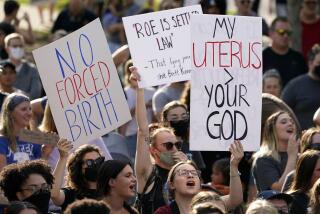More News Than Is Fit in Iowa
- Share via
DES MOINES, Iowa — So why are we here?
--Kathleen Sullivan of “CBS This Morning” on Monday
Windmills of the Gobbledygook.
The downtown convention center was nearly ringed by satellite dishes beaming TV pictures and prophecies. And so many media members were here for the week preceding Monday’s caucuses--an estimated 2,000 to 3,000--that just trying to shake hands with Iowans through the crush of reporters, cameras and TV crews became the toughest task for the leading candidates.
Were the candidates there because the media were there or were the media there because the candidates were there?
Both, historically speaking.
Former Iowa Democratic chairman Tom Whitney explained on NBC Sunday how the Iowa caucuses were calculatingly transformed in 1976 from something relatively homey, grass roots and obscure to the kind of thundering, media-smothered spectacle that now enormously enriches the state’s economy and political parties.
“First, we had to convince the candidates they had to be here because the national press was going to be here,” Whitney said. “Then we had to convince the national press to be here because the candidates were going to be here.”
As the campaign to woo Iowa for this year’s caucuses wound down, however, the smell of nervous self-doubt was in the frosty air. You could sense from some of the news media--especially network TV--a feeling of self-consciousness about their awesome presence in Iowa for an event whose role as a national barometer leading to Monday’s New Hampshire Primary is hotly argued.
First came the wave of TV stories asking: “Have we overcovered the Iowa caucuses?”
The answers were predictable: Surprise! The media had not overcovered the caucuses.
What other conclusions could they reach? Major media are journalistic Maginot lines--rigid, immovable and unalterable once committed and in place. By the time TV began wondering aloud about this year’s overcoverage, the major media had already spent so much energy and money on the coverage that they had a vested interest in the process. In fact, they had become part of the process.
Here’s to “CBS Sunday Morning” for holding out and remaining in New York--perhaps because host Charles Kuralt has spent so much time on the road that gratuitous travel seemed pointless.
However, nearly every other major news-related program on CBS, ABC and NBC--and virtually all of CNN--originated largely from Des Moines the last few days. Hence, the weight of TV’s presence--from line after line of cable to specially erected, elaborate newsroom sets--was immediately visible.
For the networks to repudiate the size of the coverage, therefore, would be to repudiate themselves.
Yet, over the weekend, came another wave of second-guessers, this time from TV news front-liners, as the networks continued beaming live reports from their portable electronic cities here.
Charles Kuralt in New York, to Bob Schieffer and Bruce Morton in Des Moines Sunday: “We’ve been accused of blowing this out of proportion. Are we doing that?”
Talk about your waffling by politicians! Schieffer and Morton sounded like Vice President George Bush circling the wagons against Dan Rather. They talked in circles. They didn’t say “yes,” but they didn’t way “no,” either.
Hugh Winebrenner, a Drake University professor who has written a book calling the caucuses “unreliable and inaccurate” as an indicator of presidential candidate strength, was courted by the national media here because of his controversial views.
Winebrenner says some network news interviewers told him privately that they agreed with his position that caucus coverage was “all out of proportion to the reality,” but that they talked a different game on the air.
The erroneous perception, Winebrenner said on ABC’s “Good Morning America” Monday, is that “something big is happening here. And it grows each and every year.”
As always, the perception becomes the reality, and candidates judged to have done poorly here often face a crisis in fund-raising.
A quote from the Orson Welles movie “Mr. Arkadin” applies to media coverage of the caucuses. Arkadin tells a story about a scorpion who asks a frog for a ride across a pond. Halfway across, the scorpion stings the frog. “Why do that?” cried the sinking frog. “Now we’ll both die.” “I can’t help it,” the scorpion replied. “It’s my nature.”
It’s the media’s nature to perform just as predictably when it comes to pouring on coverage for an event that’s accessible. The caucuses are a good story deserving of coverage, but not this much. At the very least, the network morning shows could have remained in New York with no great loss.
“I think that it’s the press that overplays Iowa,” Sam Donaldson said during ABC’s “This Week With David Brinkley” Sunday in Des Moines, where he was part of the press overplaying Iowa.
Donaldson said the caucuses give winners a “bump” toward the next stop in the campaign, “but it’s an artificial bump.”
He noted that the media tend to judge the performances of candidates according to the media’s expectations. And we all know what those expectations were for Iowa: On the Republican side, Dole had to win big or he was through, and Bush had to beat out Pat Robertson. Among the Democrats, Gephardt had to win big or it was curtains, Simon was a goner if he came in lower than second, as was Dukakis.
“This game of expectations has been going on a long time, and I expect it will continue,” Brinkley said.
“If it is nonsense, then we all do it,” Donaldson said. He was right.
On to New Hampshire.
More to Read
Get the L.A. Times Politics newsletter
Deeply reported insights into legislation, politics and policy from Sacramento, Washington and beyond. In your inbox three times per week.
You may occasionally receive promotional content from the Los Angeles Times.










